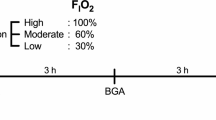Play all audios:

ABSTRACT ABSTRACT: Group B streptococcal sepsis in newborns produces pulmonary arterial hypertension and hypoxemia. The purpose of this study was to investigate the mechanisms by which
hypoxemia occurs. Ten anesthetized, ventilated piglets were infused with 2 × 109 colony forming units/kg of Group B streptococci over a 30-min period. Pulmonary arterial pressure rose from
14 ± 2.8 to 38 ± 6.7 torr after 20 min of the bacterial infusion (_p_ < 0.01). During the same period, cardiac output fell from 295 to 184 ml/kg/min (_p_ < 0.02). Arterial Po2 declined
from 97 ± 7 to 56 ± 11 torr (_p_ < 0.02) and mixed venous Po2 fell from 39.6 ± 5 to 28 ± 8 torr (_p_ < 0.05). The multiple inert gas elimination technique was used to detect increases
in shunt and alterations in ventilation-perfusion matching. Intrapulmonary shunt did not increase during or after the infusion with group B streptococci. However, there was a significant
increase (_p_ < 0.05) in the SD of pulmonary blood flow, an index of VA/Q mismatching, 20 min after initiation of the infusion of bacteria. All the above changes reverted toward baseline
during the 2-h period following discontinuation of the infusion. We conclude that the hypoxemia occurring in the early phase of group B streptococcal sepsis does not develop solely because
of increased shunt, but rather is produced by a decline in cardiac output in conjunction with mismatching of pulmonary perfusion to alveolar ventilation. SIMILAR CONTENT BEING VIEWED BY
OTHERS A HIGH FRACTION OF INSPIRED OXYGEN DOES NOT MITIGATE ATELECTASIS-INDUCED LUNG TISSUE HYPOXIA OR INJURY IN EXPERIMENTAL ACUTE RESPIRATORY DISTRESS SYNDROME Article Open access 14
January 2025 EVALUATION OF LUNG VOLUMES AND GAS EXCHANGE IN SURFACTANT-DEFICIENT RABBITS BETWEEN VARIABLE AND FIXED SERVO PRESSURES DURING HIGH-FREQUENCY JET VENTILATION Article 25 November
2023 LOW INFLATING PRESSURES DURING NEONATAL TIDAL VOLUME TARGETED VENTILATION: OCCURRENCE AND SIGNIFICANCE Article 08 May 2023 ARTICLE PDF AUTHOR INFORMATION AUTHORS AND AFFILIATIONS *
Division of Neonatal and Respiratory Diseases, Department of Pediatrics RD-20, University of Washington School of Medicine, Seattle, 98195, Washington Gregory K Sorensen, Gregory J Redding
& William E Truog Authors * Gregory K Sorensen View author publications You can also search for this author inPubMed Google Scholar * Gregory J Redding View author publications You can
also search for this author inPubMed Google Scholar * William E Truog View author publications You can also search for this author inPubMed Google Scholar RIGHTS AND PERMISSIONS Reprints and
permissions ABOUT THIS ARTICLE CITE THIS ARTICLE Sorensen, G., Redding, G. & Truog, W. Mechanisms of Pulmonary Gas Exchange Abnormalities during Experimental Group B Streptococcal
Infusion. _Pediatr Res_ 19, 922–926 (1985). https://doi.org/10.1203/00006450-198509000-00011 Download citation * Received: 19 February 1985 * Accepted: 24 April 1985 * Issue Date: 01
September 1985 * DOI: https://doi.org/10.1203/00006450-198509000-00011 SHARE THIS ARTICLE Anyone you share the following link with will be able to read this content: Get shareable link
Sorry, a shareable link is not currently available for this article. Copy to clipboard Provided by the Springer Nature SharedIt content-sharing initiative
